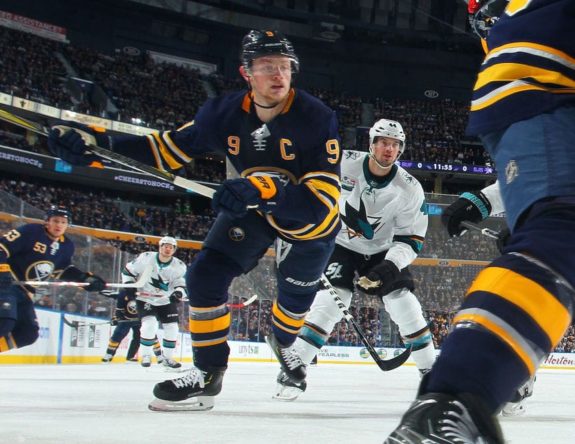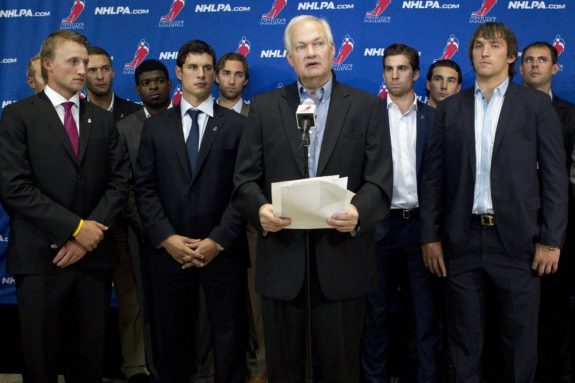The saga continues between Jack Eichel and the Buffalo Sabres. After news about a trade, his neck injury and the ramifications of surgery, there has now emerged a conflict between the NHL/NHLPA’s Collective Bargaining Agreement (CBA) and a player’s basic right to decide their medical treatment based on informed consent, according to the second doctor who gave Eichel his medical opinion.
In an appearance with Elliotte Friedman and Jeff Marek on the 31 Thoughts podcast last month, Dr. Chad J. Prusmack, a neurosurgeon based in Colorado, shared his thoughts on Eichel’s situation and what led to his recommendation that cervical artificial disc replacement (CADR) surgery would be better than the more traditional approach – the one preferred by the team – which was an Anterior Cervical Discectomy and Fusion (ACDF).

I’m not a doctor, but I can briefly summarize each surgery: During ACDF, the surgeon would remove the herniated disc in Eichel’s neck through an incision in his throat. A graft is then inserted to fuse the bones above and below. With CADR, the removed disc would be replaced with an artificial one, in most cases made of a metal outer shell and an inside made of medical-grade plastics.
“Both are phenomenal procedures,” Dr. Prusmack said. “The difference is, it’s what procedure you use in each particular person and why.”
Eichel-Sabres Recap
Most of us are aware of what is going on between Eichel and the Sabres. For those joining late, the two parties are having a bit of a disagreement (understatement) regarding Eichel’s medical treatment. The team performed its own examination after Eichel injured his neck – a herniated disk that caused him to miss the last 33 games of the 2020-21 season – and determined that, given the options available, they would start with rehabilitation and other conservative care methods.
When surgery became the recommended solution, Eichel wanted a CADR implant, but team doctors recommended ACDF. This disc implant surgery has never been performed on an NHL player, which is part of Buffalo’s concern. It has been performed successfully on athletes in other sports, such as MMA fighters, but the Sabres’ well-respected team of physicians believes that ACDF is Eichel’s best option.
Dr. Prusmack’s Prescription
The success rates for both surgeries are in the 90 percent range, Dr. Prusmack said. But it’s well documented in the literature that ACDF sometimes results in complications when the bones do not heal correctly. “Sometimes the screws and instrumentation extrudes or fails,” Dr. Prusmack said. “And it then has a bit of a higher complication rate. With an artificial disc, you’re not waiting for anything to fuse. The neck is already moving. It’s just the opposite. You want their neck to move so you can lubricate that new joint.”
Latest Sabres Content:
- Cozens Cruising Toward Bigger Role with Sabres in 2021-22
- Sabres Offseason Depth Chart: Centermen
- 10 Reasons Buffalo Sabres Fans Should Stick Around
- NHL Rumors: Bruins, Wild, Rangers, Maple Leafs, More
- NHL Rumors; Rangers, Sabres, Flyers, Canadiens, Blackhawks, More
Later on, he said, “I think a cervical fusion is an excellent option. I don’t think it is the best option for Jack. Nor do I feel that it is for any hockey players if you ask my opinion.”
Discrepancy Dilemma
Despite that there are two good options for Eichel’s treatment, what fans should find concerning is something that Dr. Prusmack quite insightfully keys in on towards the end of the broadcast, which is the discrepancy between the CBA and a player’s right to choose what they do to their body, especially, as in this case, given the potential for long-term effects. Eichel is right to refuse to lie down to the team’s preferred treatment over his own informed decision.
In terms of informed medical consent, Eichel has the right to accept or refuse treatment options if he has been sufficiently informed about what is being offered. It’s considered unethical to force medical treatment of any kind. Of course, in some cases, patients do not have the legal right to say no to treatment. Persons with an altered mental state, children, those who are a threat to the community, and hockey players under the CBA’s dominion. NHL teams, after all, do have to mitigate risk to their assets.
But through the lens of patient care and postoperative success, Dr. Prusmack disagrees with the Sabres’ doctors and backs Eichel’s claim that CADR surgery would be the most beneficial path. The CBA should uphold Eichel’s right to choose what happens to his body if he has informed consent, Dr. Prusmack said.
“That could violate his human rights to feel that he is coerced to go back to a team or [hypothetically] not being cleared once he gets the artificial disc. As a doctor, I can’t fathom this. I don’t understand why the CBA has some discrepancies here…I mean, ok, so what are we going to do to start… anyone can tell me what surgery I can and can not perform and what surgeries get performed on me, and I don’t have a choice of my body. It’s absurd.”
The CBA’s Rules on Medical Second Opinions
Khalid Keshavjee from The Win Column recently summed up the CBA rules on medical second opinions. At the end of the day, teams do, in fact, have the final say on what medical procedures a player must undergo if they have an NHL contract.
The CBA gives the team ultimate decision-making power, but players have the right to a second opinion. Eichel, or any other player who wishes to exercise that right, does not have to disclose to the team why they are seeking a second glance.

Here’s how that works: The league has an extensive list of approved doctors who can give a second opinion, and according to the CBA, the team has to pay all expenses associated with that second opinion, including travel. If a player wants a second opinion from a doctor not on the list, that’s allowed, but in some cases, the player may not want to disclose that they are seeking a second opinion, in which case the expense is their own.
As Keshavjee points out, the tricky part is that team doctors are required under the CBA to give that second opinion “serious consideration,” and what that means is vague. If there is still a disagreement, players can take the dispute to a third party who would provide an opinion.
“However,” Keshavjee writes, “there is nothing in the CBA to say that the team doctor can be overruled by the third independent specialist. The problem is that… The whole point of the medical second opinion is that players have the right to understand what will be happening to their bodies from an independent practitioner. This allows them to better understand the situation and what the objectives of that treatment are. This should also theoretically give players more of a say in what happens to their bodies. However, this is not the case given that players cannot opt to have another course of treatment instead.”
Changing the Rules
Hopefully, the Eichel situation will lead to discussions between the NHLPA and the NHL to correct this decision-making discrepancy. After all, this is an issue that, if left unaddressed, will likely come up again and again.
We may never know how many players have gone through this process only to cave to the team’s wishes because the CBA’s rules regarding second opinions or medical treatments are hard and fast; especially, if the team has the final say. But if second opinions continue to differ from a team’s medical staff between now and 2025-26, when the next CBA is negotiated, you can bet we’ll hear about it then.